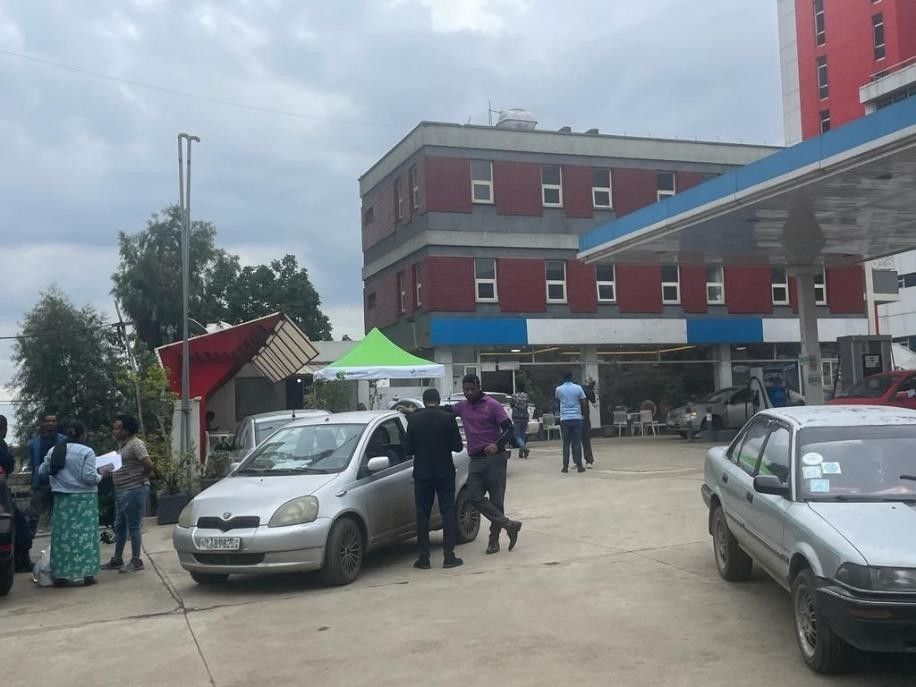Progress for 0 ad
Progress for 1 ad
Progress for 2 ad
Progress for 3 ad


Team Shega
Addis Ababa, Ethiopia

By Ibrahim Mamma and Endashaw Tesfaye
Since April 24, 2023, all 153 gas stations in Addis Ababa have started implementing digital fuel transactions, meaning that all payments now need to be made using digital payment platforms, fully replacing cash. This caused chaotic lines across the city’s main fuel stations because vehicles queued for hours to access the service and pump fuel. Many people on social and traditional media, as well as in public, are expressing frustration with how the decision and the service have been rolled out.
The concerns raised partly have to do with the limits of the apps used for payment. Initially, the service was launched using the recently launched EthioTelecom’s Superapp telebirr, despite the state-owned Commercial Bank of Ethiopia having launched its CBE-Nedaj (translated as CBE-Fuel) app in August 2022. A few days later, in response to mounting pressure and lengthy queues of frustrated drivers, other financial service providers rushed to provide the service and fill the gap.
This new initiative is a unique opportunity for telebirr and the Commercial Bank of Ethiopia (CBE) to increase adoption of payment services at gas stations. To facilitate this, however, the telebirr team was tasked with enabling transactions and registering alongside gas station pump attendants while customers fueled up their cars. The situation has also seen a rise in hawkers providing short-term relief. They take cash from drivers in the queue who do not have payment apps and, in turn, make the digital payment to the fuel attendants. They also assist them in registering for the available services, all for a small fee.
All of this happened because many drivers didn’t have the telebirr app, have never used it for making payments, and were caught off-guard when arriving to get fuel. Interestingly, a good number of drivers also did not have smartphones that allowed for downloading the super app or any other payment app required to fuel up. Even if the service was available on their phone, the registration and depositing took too long for some clients. Others arrived at the station without any information that the payment had migrated digitally. It is evident that a combination of these factors caused delays in pumping gas and making payments, leading to long and chaotic queues.
Analyzing the good, the bad, and the ugly of the current situation brings up a multitude of lessons for addressing the current challenges in fuel access. It also provides insights into what is to come in the country’s journey towards digitalization.
Timing: While many argue that the introduction of the service and the banning of cash were sudden, there are indications that the government provided a reasonable lead time in the build-up to the complete migration. Most importantly, after a periodic increase in fuel prices, the government introduced fuel subsidies for public transport vehicles, such as taxis and minibusses. These vehicles had been using the telebirr system to access their subsidized fuel, allowing the government to control the distribution of the subsidies. However, this highlights the importance of timing in introducing digital payment services, which remains a crucial factor to consider going forward.
Awareness/sensitization: Creating enough awareness and sensitizing the public about new services is also an essential element, particularly when it comes to the timing of their introduction. While awareness among customers is crucial, service providers missed a big opportunity to educate and increase adoption of the payment services at gas stations ahead of the complete move to digital payment. As initially selected service providers, CBE and telebirr could have used the grace period provided by the government to educate, register, and make clients at the gas stations aware of the digital payments and the launch of the complete digital service ahead of the specified date.
A driver at least visits the gas station once every two or three weeks, if not more, which was also the notice period initially provided by the government. The service providers could have, jointly with the 153 gas stations in the city, planned ways to make the service efficient, the processes smooth, and the waiting time shorter. It seems the gas stations were caught by surprise the same way customers were, hoping the law might not be enacted even though some preparations were being made.
However, with the time lead and preparation, service providers needed to be adequately prepared or heavily promoting the new service’s implementation. The time could also have been used to prepare sufficient support services and invest in process improvement and instruments such as smartphones, QR codes, payment terminals, etc. This is essential for payment service providers such as telebirr.
In what appears to be an afterthought, EthioTelecom has set up tents and deployed agents at every gas station to support customers. Similarly, the Commercial Bank of Ethiopia and other banks are introducing the service, such as the Cooperative Bank of Oromia, with others in the pipeline. If the same urgency in deploying services had been applied to educating customers and gas stations, these lengthy queues and waiting times could have been effectively avoided.
Testing the service: This definitely highlights the issue of access. What are service providers doing to make access easy? What if this service had not been mandatory? What if customers could opt in and out of using digital payment for pumping fuel? What opportunities does such mandatory government action present to merchant payment aggregators, considering that it could be overwhelming for gas station owners to select a financial service provider (FSP) to use while rejecting others? How can the real-time inter-bank settlement product of Eth-switch complement this product? Payment service providers could have lost a lot due to a lack of preparedness in making usage easy and convenient.
From a technological perspective, payment service providers should also prepare for handling such a massive surge of users to avoid crashing the system.
The Addis Ababa City Government has discussed with other financial institutions, exploring opportunities to bring them on board as solution providers, servicing clients’ gas stations, with the idea to expand the same concept across the country.

While such actions have a positive impact on the immediate adoption of new initiatives, they also provide further opportunities to consider. How can we leverage such actions by the government to boost competitiveness among industry players and allow customers to choose the service provider that resonates with them? How can customers best bear the cost of transactions, and how can they choose between service providers to avoid a similar rushed onboarding process with its attendant long queues in the future? The current scenario has pushed many consumers to make rushed decisions when selecting a product without having complete knowledge about it.
Service providers impose different fees, and the conditions vary accordingly. For fuel payments, it is not clear what transaction fees are or whether additional service charges are charged. How aware are the customers? What are the costs or benefits for gas stations to move from cash to digital? How does the regulator protect consumers from potential malpractices in the rollout of the system, as well as provide guidelines? Where is the pricing for the services? These questions should be answered as part of the product design to create a market-based service that fosters competition and before services are launched. Collaboration between governments and service providers can bring seamless services that benefit most stakeholders and build value.
The service is one of many public services in the country migrating to digital payment services. In July 2021, the Ethiopian government launched its first-ever digital payment strategy to accelerate inclusive growth, paving the way for digital payment platforms to proliferate and for services to process payments digitally.
In April 2022, the Ministry of Innovation and Technology, in partnership with MasterCard and the Commercial Bank of Ethiopia (CBE), launched the migration of payments through the government e-services portal, allowing Ethiopians to access and pay for government services digitally for the first time. The current situation of digitizing fuel payments at the pump is a perfect learning curve for policymakers, digital financial service providers, and customers.
UNCDF, with its role as a convenor in the digital space, has supported multiple payment services to pilot and scale, prioritizing knowledge around these services while at the same time ensuring that government departments can monitor usage through data platforms.
With the anticipated and rapid migration to the digital scene, it is essential to keep all types of customers in perspective, including ways to protect them. From a business ecosystem perspective, these present opportunities for new types of endeavors, job creation, and developing new payment schemes in the country. This can be taken case by case through the government’s mandate to push digital payment adoption across different sectors. However, digital is not a silver bullet; it is an enabler. Hence, hybrid systems should always be an option to ensure that no one is left out of the system or unintentionally excluded.
Similarly, customer awareness and service providers’ preparedness should be addressed to overcome the current chaotic but inevitable rollout. Service providers should anticipate customer needs and capabilities. Policymakers and decision-makers need to partner and engage with the private sector and the public in testing, customizing, and eventually co-creating the digitally enabled future we all aspire to see for our communities.
___________
Ibrahim Mamma serves as the Country Coordinator at UNCDF Ethiopia, while Endashaw Tesfaye holds the position of Digital Financial Services (DFS) Lead at UNCDF Ethiopia.
👏
😂
❤️
😲
😠

Team Shega
Your Email Address Will Not Be Published. Required Fields Are Marked *